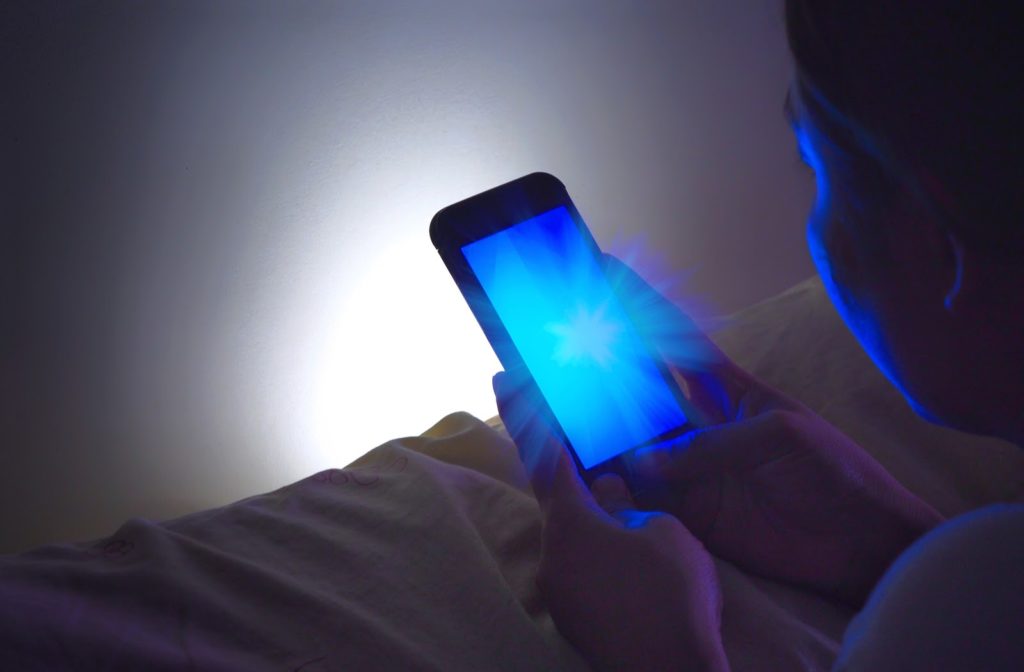Are you experiencing significant digital eye strain due to long periods of looking at digital devices? This strain on your eyes may be due to an over-exposure to HEV (high-energy visible) or “blue” light. You can potentially mitigate the effects of blue light on your eyes through the use of special lenses used in blue light blocking glasses.
What Is Blue Light?
Blue light is the shortest wavelength of visible light that our eyes can see. Beyond blue light are invisible ultraviolet rays that our eyes are unable to detect. There is an inverse relationship between the wavelength of light rays and the amount of energy they contain, meaning blue light contains the most energy for light that is visible to the human eye. Approximately one-third of all visible light is considered HEV or “blue” light.
Blue Light is Everywhere
Blue light emanates from almost all light sources, including fluorescent and LED lighting, flat-screen televisions, and most prominently, the sun. Digital devices are often considered the main source of blue light that affects our eyes due to the large amount of time we spend looking at them, but these devices actually only create a fraction of blue light compared to the amount that the sun emits.
Our Eyes Are Bad at Blocking Blue Light
While our cornea and lens can significantly block UV light from affecting our retina, virtually 100% of blue light can pass through our cornea and lens to reach our retina.
Screens
Digital eye strain can be caused by a variety of factors: not blinking enough, not taking enough breaks from looking at your monitor, and an over-exposure to blue light can all cause digital eye strain. Some studies show that blue light blocking glasses can decrease digital eye strain.
Falling Asleep
Blue light affects the body’s circadian rhythm. The blue light of a digital screen mimics the blue light of the sun, which can affect your wake and sleep cycle. When you are looking at a digital screen and blue light is hitting your eyes at night, it tricks your body into thinking it’s still daytime and suppresses the production of the sleep hormone melatonin. This can cause issues with being unable to sleep at night after spending a long time looking at screens.
Is Blue Light Bad?
Blue light can cause digital eye strain and affect our circadian rhythm, making us unable to properly fall asleep at night. It may also contribute to macular degeneration since blue light penetrates all the way to the retina and can damage light-sensitive cells in the retina, leading to vision loss.
Not all exposure to blue light is bad though. It can boost alertness, help memory and cognitive function, and elevate our mood. While it can negatively affect our circadian rhythm at night when spending long periods of time looking at digital screens, blue light is also necessary for our circadian rhythm as it keeps us energized during the day when we are exposed to sunlight.

Blue Light Blocking Glasses
If you are having issues with digital eye strain or other problems brought on by an over-exposure to blue light, blue light blocking glasses can be a good remedy for your issues.
How do Blue Light Blocking Glasses Work?
Blue light blocking glasses are glasses that contain a lens coated with a substance that reflects and blocks out certain wavelengths of light – more specifically, they block out wavelengths that are considered blue or violet light. Clear blue light blocking glasses typically block anywhere from 400 to 440 nm wavelengths (typically around 20% to 40%). Since these shorter wavelengths are likely the most damaging, that may be all you need. Amber or yellow-tinted blue light blocking glasses can block out and reflect a larger spectrum of blue light, but may not be as convenient for everyday use since they change the coloration of what you see when looking through them. These tinted glasses may be best reserved for viewing digital screens rather than everyday use.
Benefits of Blue Light Blocking Glasses
While research into the effects of spending long drawn out time in front of digital screens is not comprehensive yet, there are two main suspected benefits of blue light blocking glasses:
- Mitigating digital eye strain – Over-exposure to blue light through the extended uses and viewing of digital screens can cause digital eye strain. Some studies show that blue light blocking glasses can decrease digital eye strain and help lessen the effects digital screens have on your eyes
- Allowing for better sleep – If you are on a digital device often throughout your day, or are on a device right before you go to sleep, you may have issues falling asleep due to an over-exposure to blue light. Wearing blue light blocking glasses can help lessen the effects blue light has on your circadian rhythm.


